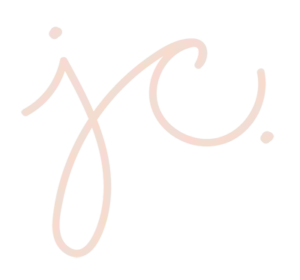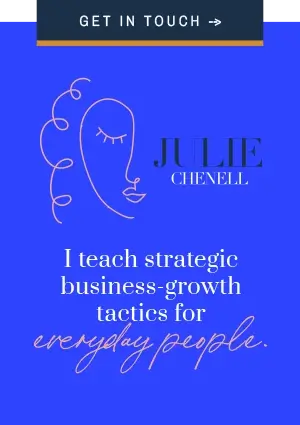In this episode, I talk about one of the hardest parts of info-product creation – writing books. I identified the one thing I really needed to do before I started writing.
Subscribe On:
Full Transcript:
Hey everyone, this is Julie. I hope you guys are doing awesome. Today. I want to talk about building a new product. A lot of us enjoy our laptop lives. Maybe we do services, we do consulting. Some of us come into the laptop life right out of the gate with an idea for a product. If you’re not a physical product business, most of the time that product is information. Information in the form of a book, a course, a coaching program, something, and product creation is one of the messiest, most satisfying, maddening things ever.
In previous episodes, I’ve talked about how dangerous it is to go create something in isolation without knowing who your audience is because then you’re not sure if it’s going to sell. However, one of the types of products that we all create, we really can’t presale it. And what is that? That’s a book, right? It’s very hard. I mean you can definitely set up preordering and all that good stuff, but at the end of the day, you still have to write the book before you sell it, so that whole backwards and methodology to finding an audience, asking them what they want, preselling them. Something that doesn’t exist yet kind of falls apart when you decide to write a book.
Some of you may want to write a book because that’s what you’ve always aspired to in life. That’s always what you saw yourself doing. Others might be writing a book just as kind of an addendum to your business. When you write a book, every possible procrastination technique that you can possibly think of will emerge in your life, and I’m laughing because number one, I work with Russell Brunson and I helped him write his books and number two, I’m writing my own. And so Russell and I are very different personalities and I have a tendency not to procrastinate. He has a tendency to procrastinate for the sake of building pressure, which is something that he needs to get things done, and yet we’re both like, I can totally tell that I’m procrastinating in my own way.
So let’s talk about product creation for a second. Let’s talk about when you have to build whatever it is you’re building before you sell it. The thing about it is that you should still work on the sales message before you write book. This is backwards a little bit. I know a lot of people have an idea for a book, right? And this is what will happen. Like you, I should write a book on, you know, X, Y, and Z, but it’s not really fleshed out. It’s like this very squishy idea out in space somewhere that doesn’t have a lot of legs. So I’m going to tell you what I’ve been working on and how I’ve been structuring my book. I am only about 10,000 words into my book. However, I was in a meeting with Russell and he’s like, everybody should be writing a book.
And I was like, he’s right and I am writing books all the time, but I’m not writing my own book and I really should make time for that. And I know that writing a book only takes a couple hours a day for, you know, a bunch of weeks and then it’s done. And then you hand it off to people who can edit it and make it pretty. So it’s like, okay, you’re right, I should write a book. So if you guys are thinking, oh, I should write a book, but A, you’re just completely overwhelmed by the process. This might help a little bit.
So what I did was I sat down with my notebook and I was very, very creative in that I did not judge like I didn’t try to write an outline. I didn’t try to make it fit into any container. It was literally a train of thought, whatever came to my mind about a particular topic.
So you just kinda like free-write on your desk. You know what your thoughts are and if they don’t make any sense, if they don’t connect, it’s okay. So you should see the notebook sheet of paper I have about my book because it was just like, oh, I thought of this. Oh, I thought of that. There was no logical connection or theme or pattern at all. But I think that’s necessary.
So if you’re writing a book, one of the things that you want to remember, especially for nonfiction, is that you want to write a book that presents a new opportunity. Now we talk about new opportunities in sales all the time. We talk about how dangerous it is to sell an improvement offer, right? It’s like, Oh, buy this lipstick wait, buy this one.
That’s better. That stays on longer, right? It’s not a very compelling sales message, especially in the markets like health and where you’re selling a diet. It’s like, Hey, lose weight and feel better. Feel better than you do. Now. The thing that happens when you deliver an improvement offer sales message is that people have to admit that they need improving and that is not a fun thing to admit to oneself, so whenever you’re selling something, you want to sell a new opportunity so that the methodology is like, okay, listen, you’ve been doing weight watchers your whole life. It’s not your fault that isn’t working. You just didn’t understand that there is a new way. It’s over here, and so then instead the sales messages, oh, I just was in the wrong car. Let me get out of that car and go in this car. When you’re doing any product creation, I don’t care if it’s a course or a book, you should still be thinking about the new opportunity that you’re presenting in the book.
So that is kind of why my note taking at the beginning of this book writing was so messy. I was looking inside my thoughts for my new opportunity and I’m writing a book on productivity for entrepreneurs. I want to teach entrepreneurs how to be productive in everything they do, not just get a little bit faster at your to-do list writing or whatever, but to actually have a life that’s productive.
So in order to do that I have to look at what I believe about productivity. I have to go back to my beliefs and I have to search through them to find where my new opportunity is. One of the things that’s difficult about finding a new opportunity inside your own thoughts is that you have to have a benchmark or an anchor. So one of the easiest ways to do that is to look at the prevailing wisdom.
So if I’m writing a book on Productivity, I’m going to look at the prevailing wisdom of the day, right? The Pomodoro technique, or you know, I don’t know what they’re all called, but I started to look at different techniques and I found that there were a lot of books on particular techniques. There’s apps, there’s timers, there’s a bunch of things like this and I still have a lot more competitive research to do, but I want to look at the prevailing wisdom of how productivity is sold in the marketplace.
And then I want to look at that prevailing wisdom and figure out what is wrong with it and once I figured out what is wrong with it, then I can identify what my new opportunity is. And so even though this kind of exercise is something that we often do on a sales page or redoing a funnel or we’re doing a webinar or anything like that, I’m doing it for my book because I know my book will be infinitely easier to sell if I do this work first.
And so I wrote down in my notes. I looked at all the things that I thought about productivity and then I started to think, okay, what is the prevailing wisdom of the day? Why don’t I agree with it? Why would I write a book on productivity if I thought the answer was in another book? I know the answer is in me and this process is very creative and very messy.
So there’s, you know if anyone tells you like that coming up with a new opportunity or a system or a way of looking at the world is easy. They’ve just never done it. It’s not easy. And so I’ve been scouring through my notes and I’m starting to see glimmers of a new way to look at productivity that’s different than what is being sold right now. It doesn’t mean that I’m going out of a hot market.
I want to stay in a hot market. I want to stay where people are buying products and info products already, but what I want to do is say, listen, I know that you’ve been really productive over here. You think this technique has saved her life, but listen, at the end of the day, I’m a thousand times more productive than you. And the reason why is because of this new way of looking at it. It’s not an improvement offer. It’s something new. So once I went through all of that, I went through the brainstorming. I went through the notebook creative exercise. I looked for the new opportunity, then I began writing. I’m aiming to write about 3000 words a day. The average book is around 60,000 words, 50 to 70, somewhere in that range. So I figured it would take me about two hours to write 3000 words, ish, depending on how concrete the thought is in my brain.
It looks about to be 60 hours of work. That’s about how long it’s gonna take to write a book. Now for you, if you want to write a book, maybe it won’t. Maybe it’ll take you a little longer than two hours per session and that’s totally fine, but think about 60 hours. Sixty hours is like a week and a half. A week and a like a work week of a week and a half. You could do this too. You totally could.
So if you are thinking about writing a book, either as the seedbed of your business or as an addendum, I would encourage you to follow along because I’ll be giving some tips and behind the scenes of the things that are working and the things that aren’t. But no matter what you decide to create, especially if you have to create something before you sell it, which is always so much more risky than doing it the other way around. Make sure you go through that exercise of finding your new opportunity and I learned all of this from Russell Brunson. If you have not purchased his book, you should go to expertsecrets.com. He talks about the opportunity switch and sales and marketing, but I think the opportunities, which is something that you don’t just need in sales and marketing, you need it in product creation as well. Hope you guys have an awesome day. Talk to you soon. Bye.
If you’re ready to create growth scale your online business, you can go to createyourlaptoplife.com/podcast and get a free plan on how you can get started today.









0 Comments